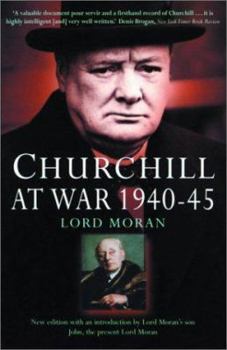Churchill: The Struggle for Survival 1940-1965
Select Format
Select Condition 
Book Overview
In January 1940, at Scapa Flow on the northern tip of Scotland, when the United States committed its support to Churchill and England; at the White House twelve months later, after Pearl Harbor, when... This description may be from another edition of this product.
Format:Paperback
Language:English
ISBN:0786710411
ISBN13:9780786710416
Release Date:October 2002
Publisher:Basic Books
Length:352 Pages
Weight:0.80 lbs.
Dimensions:1.1" x 5.1" x 7.8"
Customer Reviews
4 ratings
A gem!
Published by Thriftbooks.com User , 15 years ago
Great physicians treat the patient as much as the disease. To that end, they need psychological insight and the ability to sense what is not said, what is often repressed and hidden by their patients. Lord Moran was a great physician. He also had a keen diplomatic sense. The book is most interesting for its portraits of the great men of the era, Churchill of course, but also Roosevelt, Stalin and de Gaulle. Lord Moran's observations were quite penetrating and often provide the needed context for known policy decisions. It refreshes important notions we had of that era. One trip to Russia is memorably told, with its depiction of the terrifying climate that reigned in the Kremlin and of the black humor of the Soviet leader. The portrait of Stalin is masterful and fascinating. As for Churchill, his achievements come out as even more extraordinary than most of us realized. A great book about a most important era.
Rewarding look at Winston Churchill's war leadership
Published by Thriftbooks.com User , 16 years ago
I don't think anyone with an interest in Winston Churchill can afford to pass this book by. It's a warts-n-all portrait (a very thorough and fair one), and certainly is a breath of fresh, unsentimental air when it comes to trying to pin down the character of Churchill and his conduct as a leader during WWII. I especially admired the author's almost conversational, easy writing style, which just flows across the pages, and, the way he reveals much about himself, as well as Winston Churchill (but without thrusting himself or his POV on the reader). I found this book fascinating and am looking for a copy of its sequel, which takes Churchill from 1945 to 1965.
Unknown aspects of a complex personality
Published by Thriftbooks.com User , 21 years ago
This book is a reprinted excerpt of Lord Moran's diary who was Churchill's personal physician from May 1940 to his death. As his doctor Moran accompanied him to all major conferences. The diaries provide, therefore, fascinating glimpses into the lives of the people who have shaped the twentieth century. Although only the war years are covered here the interested reader might want to look up the complete diaries in libraries because they are no longer in print. Nevertheless, even the book under discussion shows that the Churchill who is so admired today also had his darker side and that by 1943 the Atlantic Alliance was no longer as firm as we are led to believe. At the time of the Teheran and Yalta conferences, which shaped the post-war world, Churchill had lost all influence over Roosevelt, who had gravitated instead to Stalin. Lord Moran also shows clearly that Roosevelt was no longer capable of understanding what he was up against and at Yalta it was apparent that the man was dying. He should never have run for re-election in 1944. The insights which Lord Moran brings to our understanding of the tragic twentieth century should be seriously considered because the fate of the world hangs on the physical and mental health of a handful of leading politicans.
a "magnetic, monstrous, oddly lovable man"
Published by Thriftbooks.com User , 22 years ago
Those who share my high regard for Martin Gilbert's and then Roy Jenkins' comprehensive biographies as well as John Keegan's brief but insightful biography of Winston Churchill (within the "Penguin Lives" series) will gratefully welcome Lord Moran's discussion of Churchill during World War Two. His access was direct and unlimited, serving as Churchill's personal physician until his death on January 24, 1965. According to Lord Moran, shortly after the war ended, G.M. Trevelyan strongly encouraged him to record his thoughts and feelings about Churchill as well as anecdotes which otherwise would have been lost. Thus began a process which continued until 1966, a year after Churchill's death, when Lord Moran published an 850-page memoir. Much of that volume has been reprinted in this new edition.Having read and then re-read the three previously cited biographies, I already knew a great deal about Churchill's life and career. Of greatest interest to me in this volume are the anecdotes, dozens and dozens of them, which reveal Churchill the man in ways and to an extent not previously indicated by other authors. Many of these anecdotes suggest that the Churchill was an especially "difficult" patient, one almost totally lacking in patience. Over time, he had several health problems which even his epic will power could not overcome: a number of heart attacks, three pneumonias, two strokes, one abdominal operation, a hernia, deafness, and a virulent skin disease as well as countless minor ailments. Refusing to reduce (much less eliminate) his daily consumption of cigars and alcohol certainly didn't help, nor did the quick cures of quacks whom Churchill insisted on retaining. Because of quite legitimate concerns about Churchill's health, therefore, Lord Moran accompanied him on numerous trips, recording his own opinions of dozens of contemporaries such as Roosevelt, Stalin, Atlee, Eden, and Truman. These comments leave no doubt that Lord Moran was a keen observer and a shrewd judge of other people. Alistair Cooke once said of Churchill that he "told a listless nation it was heroic, and it became so." Perhaps you are already familiar with Churchill the public figure. In this lively and informative volume, Lord Moran enables you to take Churchill's measure as (in Cooke's words) a "magnetic, monstrous, oddly lovable man."






